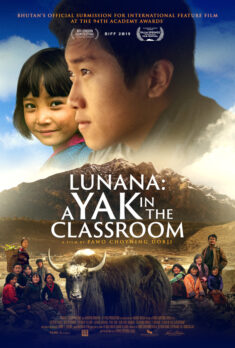Publisher
Pawo Choyning Dorji
Published
10 Mar 2023
Lunana is a feel-good movie. Its plot is predictable, its messages are somewhat naïve and its subject matter is treated with a large dose of sentimentality. The cinematography is unquestionable beautiful, but the narrative is neither ground-breaking nor even particularly original, so it might not land with the more cynical viewer.
For me, however, I found it a deeply moving story which portrayed the struggles and rewards of teaching in way that few movies do. Perhaps my enjoyment of this film was in part due to having watched it at the end of a long, hard week for the schools sector, but I found it to be a beautiful reminder of the impact teachers have on their student’s lives and a powerful portrayal of the hope and human connection of our profession.
As recent, tragic events moved many within the profession and left lots of us reflecting on our roles, the system and its impact on the people within it, this heart-warming and visually stunning film provided a few hours of uplifting escapism and a timely reiteration of the power of teachers to change lives even in the most difficult circumstances.
Directed by Bhutanese filmmaker, Pawo Choyning Dorji, the film tells the story of a disillusioned young teacher named Eugen who is reluctantly engaged in obligatory national service as a teacher. While dreaming of escaping to a new life as a singer in Australia, Eugen is sent to a mountain village in Lunana to teach in the most remote school in the world.
Shot on location is Bhutan, the film captures the beauty and serenity of the country’s mountainous landscapes, giving us a glimpse into the lives of the people who live in this remote region. Many of the actors are local villagers, which gives the film a raw, genuine and believable quality which left me wondering if the job was still available and, if so, whether my family would mind relocating to Bhutan.
The most striking aspect is the importance the villagers place on the education
For me, the most striking aspect of the film was not the journey of the young teacher or even the enthusiasm of the pupils in the class but the importance the villagers placed on the education of these five children. The whole community are collectively invested in the education of the children and show huge gratitude towards the teacher who is willing to take on the challenge of running the school with no resources, little space, a precious old Yak living at the back of the classroom and not a policy, procedure or school inspector in sight.
Eugen teaches his pupils reading and counting from his makeshift blackboard. In return he learns humility and finds contentment in this simple life, which seems apt in a country which measures its success not by GDP but rather by an index of happiness.
The idea of teaching being a wonderful profession because ‘teachers touch the future’ was enough to pull me in hook, line and sinker but the wider story of this movie is also a compelling one. Bhutan has protected itself from the problems associated with mass tourism by charging hundreds of dollars each day for visitors just to be in the country.
The 56 inhabitants of the village live without electricity or communication with the world below, which is an eight-day trek away. But even they are not immune to the issues the wider world is facing. Changes in the climate caused by actions in far-off countries are having an impact on their environment and way of life. The Himalayan glaciers are melting, lakes and drying up and the local snow lion’s home is under threat.
Reports suggest that even as the film crew were packing up their equipment and solar batteries carried up to the village by mule, other teams were moving in to install the areas first 3G masts. I’m not sure if this is progress or a travesty.
In a week also marked by the IPCC’s ‘final warning’ on catastrophic climate change, this film is an additional reminder of what we stand to lose – and education’s central role in any conversation about it.













Your thoughts